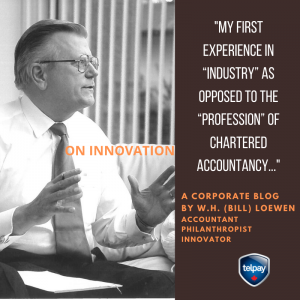My first experience in “industry” as opposed to the “profession” of chartered accountancy was at Winnipeg and Central Gas Company. One of the senior executives there made the statement that, “The purpose of business is to make as much money as possible this year without spoiling the chances of making more next year.” That can be a useful guideline in most situations, crude though it may seem if taken the wrong way.
One of the easiest ways for a corporate executive to increase profits by ten percent is by reducing corporate taxes by ten per cent. So businesses put on great pressure for governments to do so. One of the happier occasions of my life was having to pay corporate taxes. I continue to be quite satisfied to be a taxpayer.
There is a line to be walked between making too much money by taking risks and not enough by being cautious which is what the executives of Winnipeg and Central Gas were saying.
Currently, pure, naked greed seems to permeate management of larger businesses. Before the 2008 financial crisis there was a drive for profits no matter what the costs. The result was huge pain for shareholders, governments, employees and the general public. The British Petroleum disaster in the Gulf of Mexico may have resulted from a drive to get the news of a major oil strike into the next quarter results, regardless of risk to life, property and the environment. Management bonuses would be directly affected. The gamble failed and huge losses resulted.
I recall in the early nineties, when Canada was experiencing a significant recession brought on by the free trade agreements with the US accompanied by a high dollar. It became fashionable for large businesses to claim large layoffs. One executive of an Alberta oil industry company boasted he had just laid off 800 employees he didn’t need. No one thought to ask why he employed so many people that were not needed.
In a contrasting situation in the early 1960’s, Bob Scott manager of the steel fabrication division of CESSCO, a company of which I was the comptroller, had to lay off a number of employees. Bob went to the bathroom and threw up, then went to the shop and did what he had to do. Bob was ensuring the survival of the jobs of the remaining employees. By making a hard and very unpleasant decision he maintained the business in good condition and eventually was hiring those employees back again.
Another instance involving making (or not making) money occurred when I was employed as a comptroller of a firm of architects. Here you had the conflicting demand of professional practise and operating a business. The necessity of professional conduct has to supersede business demands. You cannot have buildings collapsing because the designer could save money scrimping on structural or other design aspects. But the ebb and flow of demands for their services makes for very hard business decisions by professionals such as architects. Since the choice of architects by governments is not a cut and dried best bid process, work is often politically influenced. i.e. Influenced by who donates to which party. The rule of thumb was that the architect contributed 10% of the fees received from the political party awarding the contract. Generally, the firm could make a pre tax profit of 20% of its revenues. The tax rate was roughly 50 per cent of profits so the after tax profit was 10% of revenue. The political donations were not tax deductible so in effect there was no profit in government works. Nevertheless, these professionals who spent many years training for the more exciting government jobs and who had many employees dependent on their obtaining such work, were willing to sacrifice profit for professional opportunities. They also sacrificed principals. Obtaining breaks because of what were really under the table payments was deeply disturbing. But they felt compelled to do so because it was “the way things worked.”
We often hear comments that it is necessary to maintain a business climate that serves the interest of business. I see it differently. Businesses are given their charters by government which should be doing so because it is the public the business serves. The businesses therefore should be serving the public interest before any private interest. In fact, if it is not doing so, why do we need it? To me a business owes its first duty to the public. Second comes its employees, third its founders and last the shareholders. Successful business will thrive with these priorities. Unfortunately, so do some who have their priorities reversed.
As for entrepreneurs (as opposed to established businesses) profit is not usually the motivator at all. The motivation here is the urge to build something where nothing like it exists. It can be a new idea or filling a vacuum in community needs. Profits must eventually accrue or the business will not survive. But they are a measure of success, not the success itself. I recall that after 10 years of hard work and borderline profits and losses, Comcheq finally made a significant profit. I was elated when I realized we finally had to pay taxes. Not only were we secure in our own future, we were making the added contribution to society in general.
Becoming financially secure is certainly a welcome circumstance. Eventually, though, being usefully occupied is is the true elixir of life, especially if you are financially secure.

